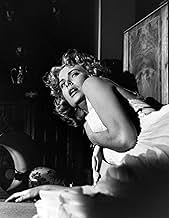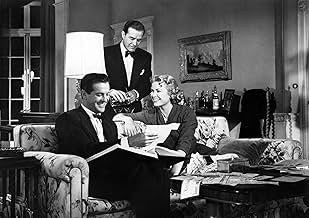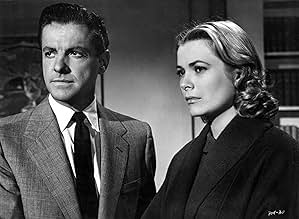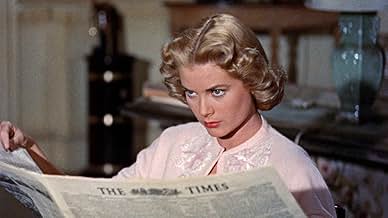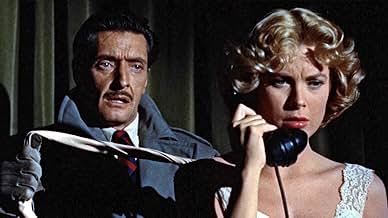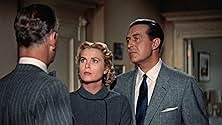A London playboy plots the perfect murder of his rich, unfaithful wife.A London playboy plots the perfect murder of his rich, unfaithful wife.A London playboy plots the perfect murder of his rich, unfaithful wife.
- Nominated for 1 BAFTA Award
- 5 wins & 3 nominations total
- Banquet Member
- (uncredited)
- Detective
- (uncredited)
- Bobby Outside Flat
- (uncredited)
- Police Photographer
- (uncredited)
- Detective
- (uncredited)
- Woman Departing Ship
- (uncredited)
- Banquet Member
- (uncredited)
- Banquet Member
- (uncredited)
- Director
- Writer
- All cast & crew
- Production, box office & more at IMDbPro
Summary
Featured reviews
The stage-originated dialogue sings with intelligence, wit, and an easy transition to the screen
But the dialogue, put on film here, is exceptional. I write this review having seen "Dial M for Murder" two or three times and wanting to see it once again. Many reviewers, myself included, have tried watching films with the sound off. I want to try the opposite. I want to close my eyes and just listen to the dialogue because it's so strong. The MacGuffin conversation at the beginning, with a perfectly cast Ray Milland blackmailing a perfectly cast Anthony Dawson into murdering a perfectly cast Grace Kelly is brilliantly written by Mr. Knott. It was clearly from a stage production, as it explains the plot background in great detail, and goes on for the better part of twenty minutes. Both men are fleshed out, giving us their personalities and individual tendencies. And even though "Dial M for Murder" pretty much stays on just one small set (an apartment in London, in which we see mostly the foyer, a little of the bedroom, and just a glimpse of the kitchen), what happens there is so fascinating that we do not really want to venture out into the city.
And that is just the setup. The dialogue remains insistently interesting and clever throughout the picture. It also has that subtle, dark sense of humor that Alfred Hitchcock was keen on. It also has the ironic touches, such as when Mr. Milland, as the jealous husband, kisses his unfaithful wife on the night she is to be murdered, and tells her: "Goodbye, my dear." The audience, having been given every single little detail about the scheme and how it is to unfold, cringes with a dark realization that Mr. Hitchcock might just go through with Mr. Milland's plot. Mr. Hitchcock, as the director, is also due tremendous credit for his trademark of creating tension. Screenwriter Knott brilliantly lays out for the audience, not the victim, how the murder will go through, but Mr. Hitchcock's camera dutifully follows everything as the scheme goes along. And, before we realize it, if something starts to go wrong, we become scared and tense. And you can imagine my guilt when I realized I was feeling scared that a plan to murder someone just might not go through. It's Mr. Hitchcock's gift at work.
Dimitri Tiomkin, a very good film composer, hits all the write notes; that includes knowing when he needs to tell his violins and trumpets to shut up. Robert Burks' cinematography is also strong with effective usage of shadows and streaks of light. Colors are omnipresent. And even though "Dial M for Murder" was shot with the intent to be seen in 3D, it is hardly evident. When I first saw the film, in much superior 2D, I did not mind the lamps and such in the foreground, such as when one bisects the screen between Ray Milland and Anthony Dawson during the opening sequence. I just thought it was a clever piece of filmmaking and misc en scene, not a cheap gimmick like in most 3D movies today. "Dial M for Murder" is a near-perfect movie of its kind, pumped full of smart dialogue and dazzling energy. This is one of the few play-to-movie transition that I have seen where I have suddenly become eager to see the original stage production.
Excellent
Cold Ray Milland plans and sets up the murder of his demure but faithless wife Grace Kelly by a virtual stranger who is urged on by the stick of exposure of his misdeeds and the carrot of GBP1,000 in used notes. Of course all of his convoluted plans go horribly or thankfully wrong, depending on your point of view, leading to an even more convoluted revised plan. When first seen when young I wasted my time because I wasn't paying attention at the critical moment so missed the point and didn't get it: the key is how did the baddie get into the apartment? It's incredibly verbose, being from a stage play after all and at times it seems nothing more than a radio show with pictures. The long scene setting and verbal sparring by Milland and Anthony Dawson is superb to hear - it's fascinating for its relentless poetry, and of displaying a now-dead world. I could never understand the attraction of 3D movies, least of all with this particular attempt, or why Kelly was continually uglified by the Hollywood machine when she never looked lovelier than in here when she was playing stressed out throughout.
I wonder if Hitch remembered the jokey murder scene he did in 1930 in Elstree Calling when Jameson Thomas realised he was murdering in the wrong apartment? Turn that key you have and go in, it's a remarkably literate film and as intricate inside as any lock.
Dial Hitchcock for Perfection
Hands down the father of noir-film.
Tense and exciting.
Dial M for Murder succeeds on many levels, and it is largely thanks to some superb dialogue, written from a tricksy-yet-capable script that never gets too deep. The cast are a treat. Ray Milland is an absolute gem, extremely sly and dispassionate, yet a character so full of self-assurance that one almost sides with him. Grace Kelly completes her great year (she gave an Oscar-winning performance in The Country Girl and also starred in Rear Window) by emanating the poised, beautiful being, that is vulnerable, yet oddly unassailable. And it's weird in that even though she's cheating on her husband, you care for her a lot more than him (although that could do with the fact that he's trying to kill her...) And John Williams, as the police detective, is quite wonderful.
Alfred Hitchcock manipulates and enthrals his audience here like the master that he is. Each scene has a sense of direction, great pacing, and is staged realistically. Stunning full colour photography and a haunting, atmospheric score from Dimitri Tiomkin complete this great package. The ending, when it comes, feels a little too nice to be truly realistic, but that is my only major quibble with an otherwise highly entertaining, thrilling movie.
One Room Thriller
Did you know
- TriviaJohn Williams won the 1953 Tony Award for Best Featured Actor in a Play for "Dial M for Murder" as Inspector Hubbard. He re-created the role in this movie.
- GoofsWendice throws a £100 bundle on a pink armchair. The money falls right at the back of the seat. A few minutes later, Swann takes the money which is now right in front of the armchair.
- Quotes
Tony Wendice: How do you go about writing a detective story?
Mark Halliday: Well, you forget detection and concentrate on crime. Crime's the thing. And then you imagine you're going to steal something or murder somebody.
Tony Wendice: Oh, is that how you do it? It's interesting.
Mark Halliday: Yes, I usually put myself in the criminal's shoes and then I keep asking myself, uh, what do I do next?
Margot Mary Wendice: Do you really believe in the perfect murder?
Mark Halliday: Mmm, yes, absolutely. On paper, that is. And I think I could, uh, plan one better than most people; but I doubt if I could carry it out.
Tony Wendice: Oh? Why not?
Mark Halliday: Well, because in stories things usually turn out the way the author wants them to; and in real life they don't... always.
Tony Wendice: Hmm.
Mark Halliday: No, I'm afraid my murders would be something like my bridge: I'd make some stupid mistake and never realize it until I found everybody was looking at me.
- Crazy creditsThe title is shown on a background of a British telephone dial; its MNO marking is replaced by a single large M which forms the single M of the title.
- Alternate versionsThe film had an intermission in its original 3-D release, although it is less than two hours in length.
- ConnectionsEdited into Histoire(s) du cinéma: Le contrôle de l'univers (1999)
Details
Box office
- Budget
- $1,400,000 (estimated)
- Gross US & Canada
- $24,845
- Opening weekend US & Canada
- $12,562
- Apr 11, 1999
- Gross worldwide
- $45,313
- Runtime
- 1h 45m(105 min)
- Color
- Aspect ratio
- 1.66 : 1



